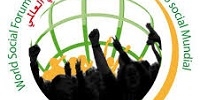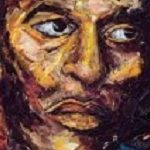
La Fondation animera une activité autogérée :
ISLAM POLITIQUE ET LUTTES SOCIALES
28 mars 2013 de 9h à 11h30,
Université EL MANAR 
Textes : Français, Arabe, Anglais
Séminaire organisé par la Fondation Frantz Fanon en partenariat avec
- Alternative Niger,
- Alternatives Internationales,Canada
- Ipam (Initiatives pour un autre monde), France
- National Lawyers Guild, Etats-Unis
- Forum des Alternatives Maroc
- Intercoll, réseau international
L’islam politique sous ses diverses expressions occupe aujourd’hui une place centrale au sein des sociétés de l’arc arabo-musulman. Idéologie justicialiste autant que spiritualité, elle a de très longue date constitué le soubassement revendicatif d’organisations politiques essentiellement « tribuniciennes » (assurant leur audience surtout par la puissance protestataire des discours de leurs leaders), éloignées des centres de gouvernement. Depuis 2011, ce qu’il est convenu d’appeler les « printemps arabes » a modifié la donne, propulsant au pouvoir des partis s’inscrivant dans cette mouvance, comme celui des Frères musulmans en Égypte ou Ennahda en Tunisie. Ces partis se trouvent confrontés à des situations sociales et économiques dramatiques et complexes, caractérisées notamment par la pauvreté généralisée et le chômage massif, des jeunes en particulier. La plupart des dirigeants des partis islamistes ne semblent pas avoir développé de discours économiques alternatifs au mercantilisme « bazariste » de leurs principaux sponsors locaux et aux conceptions néoféodales du marché de leurs soutiens wahhabites, l’Arabie saoudite et le Qatar. Pour cet islamisme largement conservateur, l’action caritative serait la seule réponse à la pauvreté. Ces conceptions promues par des alliés pétroliers stratégiques de l’« empire global » étatsunien fondé sur le « consensus de Washington » s’accommodent finalement très volontiers des préceptes de l’idéologie néolibérale. Pour autant, il serait très réducteur d’assimiler tous les partisans des nombreuses variantes de l’islam politique à de petits soldats inconscients de la mondialisation néolibérale ; et, a fortiori, à des fanatiques religieux antioccidentaux qu’il faudrait « éradiquer ». Car au sein de cette nébuleuse sociale complexe de l’islam politique, s’inscrivent aussi, surtout à la base et dans les luttes quotidiennes, de très nombreux(ses) militant(e)s, beaucoup moins visibles que leurs leaders proclamés, dont les combats syndicaux, politiques, environnementalistes, etc. n’ont rien à envier à ceux de leurs homologues « non musulmans » que rassemblent classiquement les FSM.
Comment mieux connaître ces actrices/acteurs progressistes de la « mouvance islamiste », elles et eux-mêmes souvent habités de préjugés vis-à-vis des « altermondialistes athé-e-s », symétriques des préjugés simplistes de certains de ces derniers face aux partisans (indifférenciés) de l’islam politique ? Les dirigeants des Frères musulmans et de leurs avatars peuvent-ils tenir longtemps leur ligne résolument conservatrice face à une jeunesse qui revendique des changements urgents ? Existe-t-il un discours social et économique de rupture avec la pure logique libérale et d’intégration au marché mondial prônée par les partis islamistes conventionnels ? Quels sont les porte-parole d’un islam politique renouvelé articulé autour de la prise en charge des préoccupations des déshérités, d’une redistribution plus juste et d’une politique de développement résolue ? Comment ces acteurs formulent-ils leurs propositions ? Quelles pourraient être les implications en termes d’alliances et de perspectives politiques dans les pays arabes ?
Intervenants
Amel Ben Saïd, Tunisie, médecin et syndicaliste UGTT-commission femmes-,
Islah Eddine al Jorchi, Tunisie
Ghazi Hidouci, Algérie, ancien ministre, économiste
Fabio Merone, Italie, chercheur et universitaire
Tariq Ramadan, Egypte, universitaire
Moussa Tchangari, Niger, journaliste
Débat animé par Madeleine Mukamabano, Rwanda, journaliste
الإسلام السياسي و الصراعات الاجتماعية
28/03/ 2013 09:00 الساعة 30:11
جامعة المنار
النصوص : فرنسية ،عربية وإنجليزية
الندوة التي تنظمتها مؤسسة فرانز فانون بشراكة :
ـ النيجر البديل،
ـ بدائل دولية، كندا
ـ (مبادرات من أجل عالم آخر)، وفرنسا
ـ الجمعية الوطنية للمحامين، الولايات المتحدة الأمريكية
ـ منتدى البدائل المغرب الأقصي
ـ الشبكة الدولية
الإسلام السياسي من خلال تعابيره المختلفة يحتل اليوم المكانة المركزية في المجتمعات العربية والإسلامية. أيديولوجية « عادلية » أكثر بقدر ما هي روحانية، الإسلام شكل منذ فترة طويلة الحجر الأساسي لاحتجاجات المنظمات السياسية « الخطابية » (التي تضمن جمهورها من خلال قوة الخطاب الاحتجاجي لقادتها)، البعيدة عن المراكز الحكومية. منذ 2011، ما يدعى « بالربيع العربي » قد غير الوضع، بدفع قوى هذه الحركة بالتورط في الحكم، مثل الإخوان المسلمين في مصر أو النهضة في تونس. هذه الأحزاب وجدت نفسها تواجه أوضاع اجتماعية واقتصادية مثيرة ومعقدة، تتميز لا سيما بانتشار الفقر وارتفاع البطالة، خاصة بين فئة الشباب.
معظم قادة الأحزاب الإسلامية لم تقدم خطاب اقتصادي بديل لتجارة « البازار » لرعاتهم المحليين ذات المفاهيم الإقطاعية للسوق لمؤيديهم الوهابيين، العربية السعودية و قطر. لهذا التيار الإسلامي المحافظ، الإحسان هو الحل الوحيد للفقر. هذه المفاهيم التي تروج لها حلفاء النفط الاستراتيجي « للإمبراطورية الشاملة » الأمريكية استنادا إلى « إجماع واشنطن » تتلاءم في نهاية المطاف مع مفاهيم الإيديولوجية النيوليبرالي.
ويعتبر من التبسيط للغاية المساواة بين جميع أنصار تيارات الإسلام السياسي، و تقديمهم كجنود غير واعية في خدمة العولمة النيوليبرالية ـ و ومن باب أولى ـ، كمتعصبين دينيين معاديين للغرب يجب « القضاء عليهم. » لأن في هذا السديم الاجتماعي المعقد للإسلام السياسي، هناك وخاصة في الميدان والصراعات اليومية، العديد من الناشطين و الناشطات، معظمهم غير ظاهرين مثل قادتهم المعلنين، والذين يخوضوا مقومات ـ نقابية، سياسية وبيئية وغيرهاـ مثل المقاومات التي يؤديها نظرائهم ’غير المسلمين’ المجتمعين في المنتدى الاجتماعي العالمي.
كيف يمكن فهم أفضل لفاعلين / فاعلات التقدميين « للتيار الإسلامي » وهم أنفسهم في كثير من الأحيان لديهم أحكام مسبقة فيما يخص » المناهضين للعولمة الملحدين »، تناظر الأحكام المسبقة المبسطة من بعض هؤلاء أمام أنصار (غير متمايزة) للإسلام السياسي؟ هل يمكن للقادة جماعة الإخوان المسلمين أن يستمروا على نفس المنهاج المحافظ لزمن طويل أمام شباب يطالب بتغييرات عاجلة؟ هل هناك خطاب اجتماعي واقتصادي كقطيعة مع المنطق الليبرالي الخالص والاندماج إلي السوق العالمي الذي تدعو إليه الأحزاب الإسلامية التقليدية؟ من هم المتحدثين باسم إسلام سياسي متجدد يتمحور حول الرعاية باهتمامات المحرومين، إعادة توزيع أكثر عدلا و سياسة تنموية مؤكدة ؟ كيف يمكن لهذه الجهات الفاعلة صياغة مقترحاتهم؟ ما هي الآثار المترتبة فيما يخص التحالفات والآفاق السياسية في الدول العربية؟
المتدخلين
أمال بن سعيد، تونس، طبيبة ونقابية
إصلاح الدين جورشي، تونس
غازي حيدوسي، الجزائر، وزير سابق، خبير اقتصادي
فابيو ميروني، ايطاليا، باحث وجامعي
طارق رمضان، مصر، جامعي
تشنقاري موسى، النيجر، صحفي
المناقشة تديرها موكامابانو مادلين، رواندا، صحفية
POLITICAL ISLAM AND SOCIAL STRUGGLES
2013 March, 28
9 to 11.30 am
EL MANAR University
Seminar organized by Frantz Fanon Foundation, in partnership with
Alternative Niger,
Alternatives Internationales, Canada
IPAM (Initiatives for Another World), France
NGL (National Lawyers Guild), United States
Forum des Alternatives Morocco
Intercoll International Network
Political Islam in its various expressions today occupies a central place in the societies of the Arab-Muslim world. As an ideology based in justice and spirituality, and because of its resistance orientation, political Islam has long been the bedrock of political and social protest in the region. Unlike many secular political leaders, Islamists have attained legitimacy in the eyes of their supporters because of their location for so long outside of the centers of government power.
The situation has dramatically changed since 2011 and the so-called « Arab Spring », which has witnessed the rise to power of various Islamist parties, such as the Muslim Brotherhood in Egypt or Tunisia’s En Nahda, through democratic elections.
These parties face dramatic and complex social and economic challenges, characterized especially by widespread poverty and high unemployment, particularly among the educated youth. Most leaders of Islamist parties do not seem to have developed an alternative economic discourse to the « bazarist » mercantalism of their domestic sponsors or to the neo-liberal market conceptions pushed of their wahhabite, Saudia Arabia and Quatar.
For this conservative Islamist, charity is the only answer to poverty, a notion which sits well with the ‘Washington consensus’ based neoliberal economic order.
However, it would be very simplistic to see all supporters of the many variants of political Islam as “petits soldats”, unaware of neoliberal globalization, and/or as anti-Western religious fanatics who should be « eradicated. »
Within the nebulous social complexity of political Islam, and especially at the base and in the less visible everyday struggles of the rank and file, men and women activists, different forms of social and political activism exist. In their involvement in trade unions, student movements, community activism, political and environmental struggles, Islamist activism is equal to that of their ‘non-Muslim’ or secular Muslim counterparts who typically gather at the WSF.
How can we better understand these progressive men and women who are part of the « Islamist movement », and who have often been on the receiving end of the prejudiced views of their atheist anti-globalization counterparts ?
Can the leaders of the Muslim Brotherhood and ideologically aligned Islamist movements in the region maintain their decidedly conservative line while facing a youth demanding urgent changes ?
Does there exist an alternative social and economic discourse which breaks with the pure market logic and global integration advocated by the conventional Islamist parties ?
Who are the spokespeople of a renewed political Islam that makes primary the concerns of the underprivileged, a fairer redistribution of wealth and policy of — development ?
What types of leftist-Islamist alliances have emerged in the past and what can they teach us about current or future potential for similar alliances to form ? What role did Islamists/Islamist demands play in the revolutionary dynamics ?
How do these actors formulate their proposals ?
What might be the implications of alliances and political perspectives in the Arab countries ?
Speakers
Amel Ben Saïd, Tunisia, physician and tradeunionist, UGTT-women-Committee
Islah Eddine al Jorchi, Tunisie
Ghazi Hidouci Algeria, former minister, economist
Fabio Merone, Italy, academic and researcher
Tariq Ramadan, Egypt, academic
Tchangari Moussa, Niger, journalist
Facilitator : Madeleine Mukamabano, Rwanda, journalist

